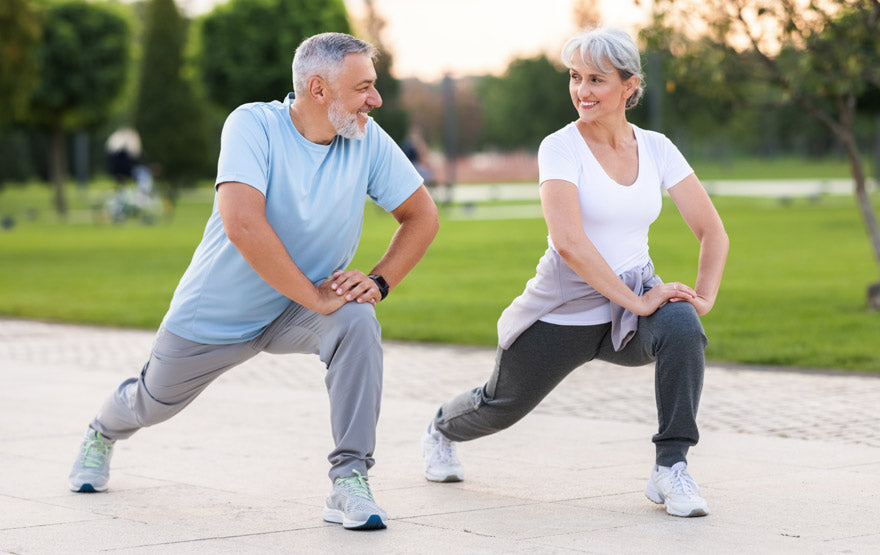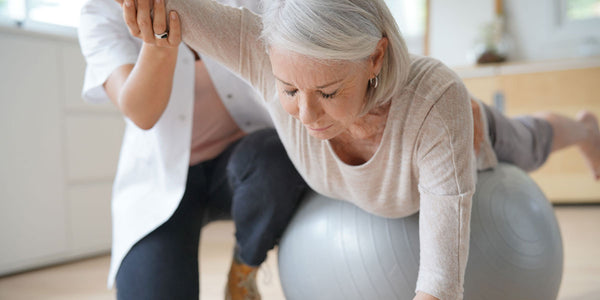Your Cart is Empty
Injury

It’s not always easy to make the extra effort to get in another half hour of cardio a day. However, if the improved heart health, muscle strength, and weight loss aren’t enough of a motivation, you may be interested to learn that exercise can boost your brain too. For seniors struggling with memory loss, exercise can even be a way to improve our brain’s ability to form new memories and hold onto the ones we have.
It’s not news that exercise comes with a wide range of benefits, including improving heart health, staving off conditions like diabetes and heart disease, losing weight, and even boosting mental health. What you might not know is that the effects of exercise on the brain go far beyond a short-term pick-me-up. In fact, it might be able to help you remember where you left the TV remote.
Recent research suggests that even one workout can improve recall memory in the short term. Those that enjoy exercise on a regular basis may find even more significant benefits. Over years and decades of regular exercise, you can improve your memory and protect against its degradation as you age.
The research shows that people who lead more active lifestyles have better memory overall. However, the tests also found that different types of exercise improve different types of memory.
For example, light exercise like walking has been linked with improved episode memory. This is the ability to remember details about daily events, like conversations with friends or attending a wedding of a family member.
On the other hand, more intense exercise like running and weight lifting has more of an impact on spacial memory. This type of memory is linked to the ability to remember the physical relationships between places and objects. That means it can be the perfect option for those who are constantly misplacing the TV remote or their car keys.
If you’re looking for a more intense workout, try adding ankle weights!
You might be surprised at the number of different ways exercise can boost your brain. Take a look at some of these benefits for some motivation to get moving.
Most exercise elevates your heart rate, which speeds up your circulatory system. This is what we mean we say, “get your blood pumping.” What most people don’t consider is that this applies to the brain too. Exercise keeps your blood moving, allowing it to deliver needed nutrients to the brain and promoting the production of molecules that improve its functioning. This can be a major boost to overall cognition, as well as memory.
Looking for new ways to work cardio into your regular routine? Try some of these exercises.
Exercising isn’t just a way to help you remember where you left your car keys, it can also help us hang onto our most precious memories years into the future. Exercising helps the brain form new synapses, which are important to both learning and memory. More synapses mean your brain is better at taking in the details of the here and now. Ultimately, this translates into more details memories that we hold onto longer.
Don’t forget to add brain boosting foods into your diet to help improve your memory.
If you’ve ever experienced runner’s high, you already have an idea of how exercise can improve our mood and let us feel our best. The feeling comes from the endorphins our body releases in response to physical exercise. While these endorphins won’t eliminate feelings of stress entirely, they can help limit the effect they have on our brains. This has a wide range of effects, including improved concentration and memory.
Cortisol is one of the main hormones associated with stress. Learn more about how it affects you here.
With more than 5 million Americans suffering from Alzheimer’s, the search for an effective intervention is more important than ever. While it still isn’t possible to cure Alzheimer's or even diagnose it early, there are some simple habits that can reduce your chances of contracting it.
According to a study in 2018, Alzheimer’s patients who lived less active lifestyles found faster brain deterioration than those with more active lives. Another study found that regular exercise is able to slow deterioration in key parts of the brain.
While it isn’t the cure scientists are hoping for, it’s an important piece of the puzzle. Evidence is beginning to suggest that increased blood flow to the brain throughout life can help protect it against some of the worst effects of aging.
Anyone who exercises regularly knows from experience that “runner’s high” isn’t just a figure of speech. The reason why physical activity feels so good is that our brains release a variety of good-feeling neurochemicals, including dopamine, serotonin, and other endorphins.
What you might not know is that these neurochemicals do more than feel good. They also reduce levels of stress in the brain. In fact, the part of your brain that is used to focus on tasks uses dopamine to work. What that means is the more dopamine it has, the better you’ll be able to stay focused.
Regular exercise bulks up our muscles and makes our hearts stronger, but did you know that it can also literally bulk up our brain?
Both hippocampus and prefrontal cortex are susceptible to deterioration as we age, which means they continue to shrink as we age. As they shrink, our memory, focus, and other brain functions are affected. In fact, for those between 50 and 60 years old, the brain shrinks around 2% on average each year.
The good news is that regular exercise helps slow this process. By forming new blood vessels in the brain, it actually helps the brain expand in size. While it doesn’t stop the aging process, it helps protect your brain functioning well into old age.
The great thing about exercise is that it can be done pretty much anywhere, whether that’s in the comfort of your own home or at your local gym. However, if boosting brain health is your goal, you may be better off joining a class rather than following a personal routine at home. Regular social contact is one of the key ways seniors can keep their brains active and healthy. That means getting in your cardio alongside a group of other fitness enthusiasts will have a more positive impact.
As you can see, physical exercise comes with plenty of benefits to your brain. However, getting the most out of your workout isn’t always easy. Follow these guidelines for the maximum impact on your brain health.
One of the best ways to keep our brains healthy as we age is to introduce them to new experiences on a regular basis. Books, travel, and hobbies can all be a good ways to keep your mind active and strong. This also applies to exercise, which helps build new neurons in your motor cortex.
However, the way we exercise matters when it comes to brain health. Following the same exercise routine day in and day out can still keep the rest of your body healthy, but it isn’t the best way to stimulate your brain. Instead, try something new and challenge yourself. This can mean jogging a new route, adding new moves to your weight-lifting routine, or trying a whole new kind of class.
There isn’t any best exercise for your brain. Rather, adding variety to your physical fitness is the best way to stay engaged. Plus, it can be a good way to motivate yourself to stick with your regular exercise.
There are plenty of ways to spice up your regular workout. A new piece of equipment like a rowing machine might be just the thing you need.
While there isn’t any single exercise that will boost brain health on its own, evidence suggests that aerobic exercise can have the biggest impact on brain health. Regular aerobic exercise strengthens your blood vessels and even encourages the growth of new ones in the brain. It’s always good to add variety to your workout, but make sure aerobics is at the core.
Aerobic exercise is anything that boosts your heart rate and provides cardiovascular conditioning. Here is a list of ideas to get you started.
The amount of exercise that’s best for you depends entirely on your individual needs, both for your brain and your body. For most people, getting in 15 minutes of vigorous exercise three days a week is a great place to start. However, high-intensity workouts may not be the ideal choice for older adults, and 30 minutes of moderate exercise could be a better option. The key is understanding the limitations of your body.
No matter what kind of exercise you do or in what quantity, the most important factor is staying committed to your routine. Squeezing in daily high-intensity workouts for a month or two is great, but it’s not likely to have a major impact on your brain health unless you stick with it. Rather than setting the bar unrealistically high, it’s better to choose more realistic fitness goals and build up your expectations little by little.
Consider tracking your daily progress for extra motivation by wearing a fitness tracker.
Much of the research on the relationship between exercise and memory is still fresh, but with each passing day, it becomes more clear that a strong body makes a strong mind. While even the most dedicated workout routine won’t completely protect you from the effects of aging, regular physical exercise will be sure to show at least some mental benefits. The key is choosing a fitness plan that works for you and sticking with it throughout life.


![The Benefits of Flexibility [A.K.A. The Secret Sauce for Aging]](http://www.vivehealth.com/cdn/shop/articles/Smiling-retired-woman-listening-to-music-while-stretching-legs-outdoors._600x.jpg?v=1713090677)
